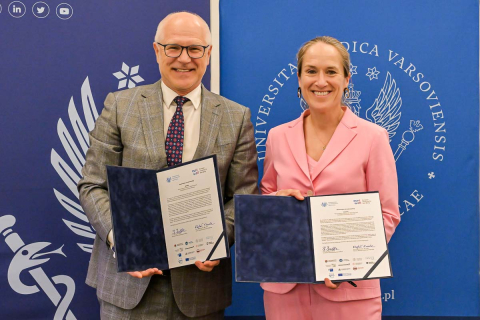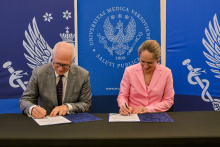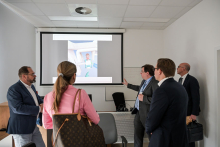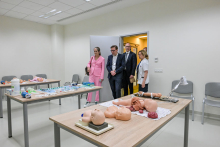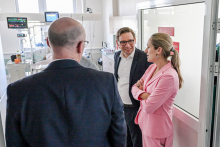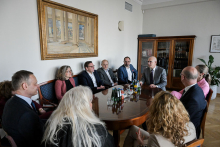Professor Beatrix Busse, Chief Development Officer of EUniWell and Vice Rector for Teaching and Studies at the University of Cologne, and Professor Rafal Krenke, Rector of WUM, signed the agreement during an EUniWell delegation visit to Warsaw. Its members visited the university campus on Banacha Street, held talks with WUM rector’s authorities and gained insights into the university’s history, academic excellence, clinical facilities, and research infrastructures.
This agreement marks a milestone in our collaborative efforts. The Medical University of Warsaw adds outstanding expertise in health and well-being to EUniWell's portfolio, and we are excited to begin working more closely together. By combining our strengths, we can create real impact - both within our universities and far beyond - Professor Beatrix Busse stated.
Joining forces with EUniWell reflects our commitment to advancing academic excellence through international collaboration. We strongly believe that well-being must be a foundation of modern education and research. Collaboration with EUniWell, particularly in the medical and health sciences, enables us to further this mission with a broader, European context - stressed Prof. Rafal Krenke.
The EUniWell delegation included: Graham Harrison - Managing Director of EUniWell and Dr. Kathrin Schlueking - EUniWell Grants Manager. From the MUW side, the meeting was attended by Prof. Michal Grąt, Vice Rector for International Relations, Development and Promotion, Dr. Olga Rostkowska EUniWell Coordinator at WUM and other representatives of the university's academic community.
What is EUniWell
EUniWell - the European University for Well-Being, is one of 65 European University Alliances selected for funding by the European Commission under the ERASMUS+ program. EUniWell is formed by eleven universities of Birmingham (UK), Cologne (Germany), Florence (Italy), Inalco (France), Konstanz (Germany), Linnaeus (Sweden), Murcia (Spain), Nantes (France), Santiago de Compostela (Spain), Semmelweis (Hungary), and Taras Shevchenko National University of Kyiv (Ukraine). The Medical University of Warsaw joins as the 12th university. The Alliance is supported by more than 60 associated partners from all sectors of society.
Focusing on well-being, EUniWell implements the provisions of the European Union's 2019 document on the “Economy of Wellbeing.” It describes a new approach in political and economic management that places the well-being of the Union's societies as the main goal of its action. The Economy of Wellbeing is based on balanced economic policies and sustainable development. It aims to ensure access to public services for all, including health and social services, long-term care, health promotion, social protection, and education, including lifelong learning. It stresses the importance of employment, active labor market policies, occupational health and safety, and decent working conditions. It advocates equal opportunities, gender equality and social inclusion. According to the document, well-being offers a new way to measure progress of societies beyond GDP and purely economic indicators.
Why there's a place for MUW in EUniWell
The Medical University of Warsaw is not only one of the oldest, but also one of the largest medical universities in Poland. It has the largest clinical base in the country. Through its scientific and teaching activities, WUM is deeply committed to improving public health. With its international perspective and interdisciplinary focus, WUM pursues values that are closely aligned with the goals of EUniWell.
Warsaw Medical University's academic profile closely matches EUniWell's five thematic arenas. They are as follows: health, social equality, environmental change, culture and multilingualism, and teacher education.
The signed agreement opens up a wide range of opportunities for academic collaboration, including joint research endeavours, co-development of educational offers, civic engagement initiatives, and efforts to promote the well-being of student and employees.
